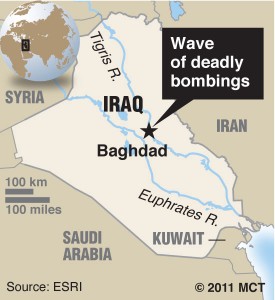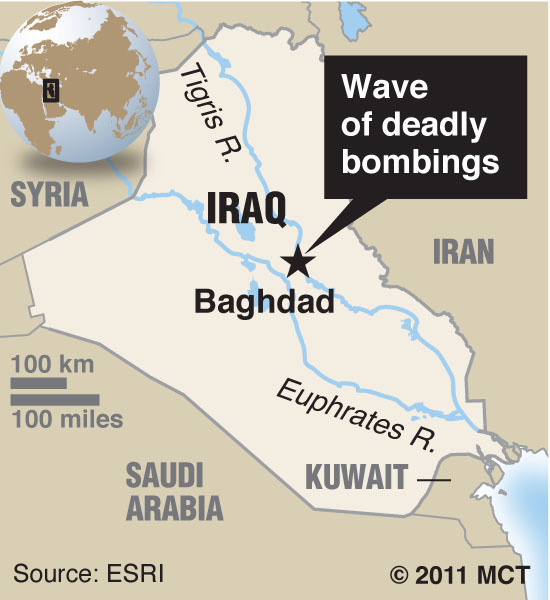 By Roy Gutman and Sahar Issa, McClatchy Newspapers –
By Roy Gutman and Sahar Issa, McClatchy Newspapers –
BAGHDAD — A dozen car bombs detonated Thursday in the Iraqi capital, killing 65 people and wounding more than 200, in the latest blow to Iraqi stability following the departure of U.S. troops last weekend.
The attacks, which came amid a serious government crisis, were directed at Sunni Muslims as well as Shiites, at mixed areas and even a once mainly Christian neighborhood — an almost inexplicable pattern that suggested extremist groups of different sectarian backgrounds were involved.
Among the casualties was a Turkish worker killed and three of his countrymen wounded in the Dora neighborhood, where there were three explosions.
The White House said in a statement that the “terrorist attacks against innocent Iraqis” served no agenda “other than murder and hatred.”
The first spate of attacks — 10 car bombs, six roadside bombs, one bomb attached to a car and one mortar shelll — occurred in the early morning, according to an Interior Ministry official. Two more cars were blown up Thursday evening.
The attacks added to Iraqis’ fears that the country is heading into an unstable future as the Shiite-dominated government publicly battles the country’s Sunni and Kurdish minorities in a controversial case involving Sunni Vice President Tareq al-Hashimi.
<div style=”border-style:solid;border-width:1px;border-color:#cccccc;background-color:#eeeeee;padding:30px;font-style:italic;color:#006600;margin-top:10px;margin-bottom:10px;”>
An officer in the Iraqi counterterrorism command, who could not be named as he isn’t an official spokesman, said some of the attacks may have been a misguided attempt to show support for al-Hashimi, who is now under attack by Shiite Prime Minister Nouri al-Maliki. But he added there are also armed “sleeper cells” supported by different sects that are waiting to take advantage of political, ethnic or sectarian division in hopes of bringing a return to the sectarian violence of 2006-2007.
“Are we going to be forever between the anvil and the hammer?” asked Jawad Abu Ali, a mechanic, in central Baghdad near the scene of one explosion. “Aren’t our politicians going to settle down and get on with the business of governance? They should either all go to jail or turn a new page in order for the poor Iraqi people to have a normal existence.”
</div>
There was no sign Thursday that the politicians were going to settle down or turn a new page. Instead, the standoff sharpened as Kurdish leaders refused to serve an arrest warrant against al-Hashimi, an order that appears to be based entirely on the televised accusations of three former guards from his security detail.
“Many Iraqis from across the political spectrum appear concerned about what they term political aspects of this case, such as the television appearances” of the three arrested bodyguards, said a U.S. official, who spoke on condition of anonymity under diplomatic protocol.
“There seems to be a reasonably legitimate case against” the security guards, reporters were told, including physical evidence that some were involved in building bombs. There were no apparent signs that the confessions had been coerced.
But observers have been troubled by what was described as “the foolish ‘in-your-faceness’” of the government’s case against al-Hashimi, whose motive for running an assassination squad isn’t clear. Some note that while all this was going on, al-Hashimi was a leader of a campaign to eliminate immunity from prosecution for government officials.
Al-Hashimi sought refuge in semiautonomous northern Kurdistan after the prime-time spectacle of the TV confessions. Kurdish refusal to serve the arrest warrant issued by a five-judge panel has in turn raised questions about the rule of law in Iraq.
A number of senior political aides in al-Maliki’s own coalition have told McClatchy Newspapers that other than the confessions, there is no hard evidence that al-Hashimi personally directed the guards in a string of assassinations dating back to 2009. That said, it would be hard for al-Hashimi to deny ultimate responsibility if guards in his employ were running assassination squads.
In addition, the Iraqi Islamic Party, which al-Hashimi formerly headed, is believed to be infiltrated by al-Qaida in Iraq.
The controversy erupted just as the last U.S. troops departed Iraq over the weekend. The arrests of the three guards occurred earlier this month, on the eve of al-Maliki’s trip to Washington for talks with President Barack Obama. While in Washington, U.S. officials, who knew of the arrests, asked al-Maliki for an explanation, McClatchy Newspapers learned. It wasn’t clear how al-Maliki responded.
Al-Maliki told reporters Wednesday that while he was in Washington, U.S. officials told him: “Let’s release these officers.” He said he replied: “It’s not up to me, it’s up to the judiciary.” U.S. officials in Baghdad said they did not recall such a conversation.









